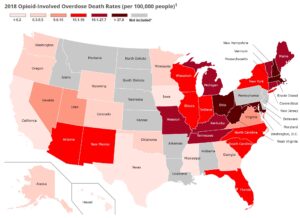It appears that all the media discusses lately is the pandemic. Throughout the pandemic, the appropriate government bodies have continued their efforts to fight continuing issues, like the opioid crisis. Community health centers play a large role in fighting ongoing social issues and are unique in that they can create programs based on their patients’ needs to provide the upmost level of care.
In a recent story concerning opioid abuse and the nation’s current issues and government efforts to combat the crisis, a certain group that already has a lot to overcome is having a harder time receiving the treatment needed to kick the habit: pregnant women and new moms. One of treatments for those that abuse opioids is to provide opioids at a lower dosage that eventually wans the user from using opioids altogether. “According to a Vanderbilt University study, pregnant women are 20 percent less likely than non-pregnant women to be accepted for medication assisted therapy. [Wright Center, a FQHC in Pennsylvania], launched a comprehensive opioid treatment program to address the growing crisis in their community in 2016. [After realizing] that a [large] number of [their] patients were pregnant – and had specific needs – ‘The Healthy MOMS program was [created. The program] is [for] mothers who are [either] expecting or have recently had a child. [Moms can stay in the program until their child is 2 years old]. The program provides behavioral health services, housing assistance and educational support. [Since the pandemic, Wright Center’s] providers have taken it a step further by delivering groceries [to those in the program].
 FQHCs work to bring services that better the community in which they operate. While the opioid crisis is a nationwide issue, some states’ issue is more pressing than others. According to the (Centers for Disease Control and Prevention) CDC, West Virginia, Maryland, New Hampshire, Ohio, Massachusetts, Connecticut, Washington D.C., Rhode Island, Kentucky, Main, Vermont, Michigan, Tennessee and Missouri had the largest amount of opioid-involved death rates in 2018. Other issues that Americans are dealing with include alcoholism. New CDC data from 2000 to 2018 shows that mortality related to alcohol in adults 25 and older has increased. Alcohol sales have increased in 2020 since the pandemic “started.”
FQHCs work to bring services that better the community in which they operate. While the opioid crisis is a nationwide issue, some states’ issue is more pressing than others. According to the (Centers for Disease Control and Prevention) CDC, West Virginia, Maryland, New Hampshire, Ohio, Massachusetts, Connecticut, Washington D.C., Rhode Island, Kentucky, Main, Vermont, Michigan, Tennessee and Missouri had the largest amount of opioid-involved death rates in 2018. Other issues that Americans are dealing with include alcoholism. New CDC data from 2000 to 2018 shows that mortality related to alcohol in adults 25 and older has increased. Alcohol sales have increased in 2020 since the pandemic “started.”
Expansion – whether it’s adding a specialty, provider(s), programs like the one discussed above, 340B Pharmacy, etc. – is one of the many keys to unlocking financial independence. Not sure where to start or how to expand your practice? Check out our practice expansion fact sheet.
Financial independence can be obtained through profitable services that serve the community, the patient base and work to provide better healthcare to all.






